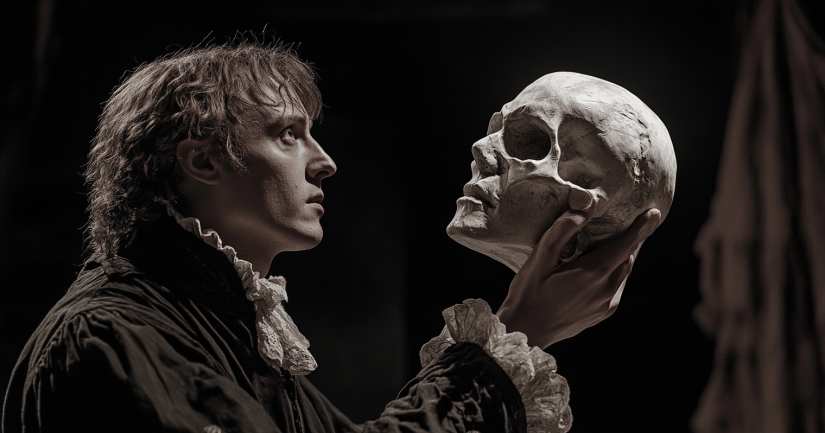
Truth, trickery, and tragedy collide in this fast-paced Hamlet True or False Quiz designed to test what you really remember. Whether you’ve studied the play line by line or just absorbed its unforgettable moments, this quiz will challenge your memory, your attention to detail, and your ability to separate fact from fiction. Shakespeare’s Hamlet is loaded with deception, mistaken motives, and characters who lie to others—and sometimes to themselves. This quiz flips that idea on you: can you tell what’s true?
Each statement in the Hamlet True or False Quiz pulls directly from major plot points, famous lines, and character actions. From Claudius’s secrets to Ophelia’s fate, from Rosencrantz and Guildenstern’s loyalties to Hamlet’s many performances of madness, the questions will make you think twice before choosing your answer. Every one is a chance to sharpen your understanding of the play and reflect on how Shakespeare plays with perception.
Think you’ve mastered the language of Elsinore? Sharpen your skills with the Hamlet True Or False Quiz or reflect on iconic lines in Hamlet Quotes.
Discover Your Results – Begin the Hamlet True Or False Quiz
Moments You Might Not Remember Clearly
You probably remember that Hamlet hesitates to kill Claudius. But do you recall exactly when Hamlet meets the ghost? Or whether Gertrude ever admits guilt? This quiz throws in just enough curveballs to make even seasoned readers pause. Some truths are buried in subtext, and some lies are told with a smile.
Expect statements that play on common misconceptions. Did Hamlet ever confess his love to Ophelia in front of the court? Does Laertes plot revenge from the moment he returns to Elsinore? Which characters survive to the end? This quiz isn’t just about memory—it’s about clarity.
Themes That Come Through in Every Question
One of the great strengths of this quiz is how it reveals Shakespeare’s recurring themes. As you decide what’s true and what’s not, you’ll encounter reflections of the play’s core ideas: truth vs. appearance, action vs. inaction, loyalty vs. betrayal, and sanity vs. madness.
In doing so, this quiz becomes more than just trivia. It becomes a way to revisit the ideas that drive the play. What does it mean to “seem” something in Elsinore? What lies do characters tell to protect themselves—or destroy others?
Fast-Paced, High-Stakes Fun
Unlike other quizzes that ask you to write essays or remember exact quotes, the Hamlet True or False Quiz is quick and energetic. One sentence. One judgment call. But just because the format is fast doesn’t mean the questions are easy.
This quiz covers all five acts, mixing major plot turns with smaller details that reveal character depth. Some answers will come to you instantly. Others will make you rethink everything you thought you knew about a character’s motivations or the story’s timeline.
Literary Tools Hidden in the Truth
Shakespeare’s craft doesn’t vanish in a true-or-false format. In fact, the more you know about his use of irony, symbolism, and dramatic tension, the better you’ll do. The quiz touches on recurring symbols like the skull in the graveyard, the poisoned cup, and Hamlet’s use of theater as a trap.
These aren’t just props. They represent larger ideas, and understanding their place in the story will give you an edge. You’ll also encounter questions that rely on tone, implication, and word choice—all the elements that make Shakespeare’s work so rich.
Findable and Flexible for Every Learner
Whether you’re a student reviewing before an exam, an actor rehearsing a role, or a Shakespeare fan looking for a challenge, this Hamlet True or False Quiz is designed to be useful and fun. It’s also fully optimized to make sure learners can find it easily, with top keywords like:
- Hamlet True or False Quiz
- Hamlet facts and fiction
- test your Hamlet knowledge
- Hamlet quick quiz
- Shakespeare true or false challenge
- Hamlet trivia for students
With a clean format and engaging phrasing, it’s a perfect classroom tool or personal study break.
Ready for the Final Curtain?
The truth isn’t always obvious in Hamlet. Lies are layered, facts are twisted, and characters hide behind their words. That’s exactly what makes this quiz so rewarding. Every correct answer proves you’re paying attention. Every mistake shows you just how slippery the truth can be in Shakespeare’s world.
If you think you’ve got a grip on what really happens in Denmark, it’s time to prove it. Let’s see how well you know the story, the characters, and the chaos with the Hamlet True or False Quiz.
Hamlet Quizzes: Follow the timeline of betrayal & revenge …
Hamlet General Knowledge – FAQ
The central theme of “Hamlet” focuses on revenge, morality, and existence. It examines how the quest for vengeance can lead to moral decay and existential despair, especially through Prince Hamlet, who struggles with indecision and the repercussions of his choices.
The main characters include Prince Hamlet, the protagonist; King Claudius, his uncle and antagonist; Queen Gertrude, Hamlet’s mother; Ophelia, his love interest; and Polonius, Ophelia’s father. Each character plays a vital role in the tragic narrative, contributing to themes of madness, betrayal, and the search for truth.
Several symbols enrich “Hamlet.” Notable examples include Yorick’s skull, representing mortality; the ghost of King Hamlet, symbolizing unresolved past issues; and the play within a play, which reveals truth and deception. These symbols deepen the audience’s understanding of character motivations and the play’s broader messages.
The setting of Elsinore Castle in Denmark creates an atmosphere of surveillance and entrapment, mirroring Hamlet’s internal conflict. The castle’s isolation heightens themes of betrayal and intrigue while reflecting Hamlet’s mental state as he navigates a world filled with deception and moral ambiguity.
Hamlet’s soliloquy often contemplates life and death, weighing the pain of existence against the fear of the unknown in death. Some see it as a reflection on the human condition, while others interpret it as an expression of Hamlet’s paralysis and indecision, encapsulating the play’s exploration of existential themes.
